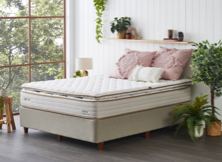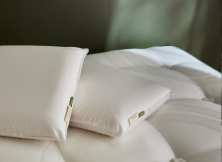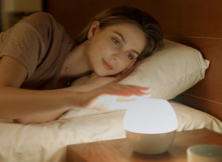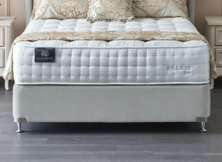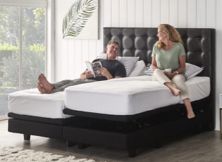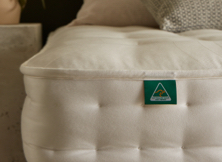Your bedroom is your own personal haven and a safeguard from the stresses of everyday life. There are four main environmental factors that can affect your sleep: noise, light, temperature and comfort.
Your Challenge
Take control of your sleep environment.
- Block out noise
- Use earplugs to block out external noise or white noise that might come from objects in your room, such as a fan.
- Make it dark
- Cover flashing lights, alarm clocks and phones or move them out of the room all together.
- If possible use block-out curtains.
- Invest in an eye-mask.
- Keep cool
- Wear breathable nightwear (or none at all!)
- Make sure your bedding is suitable for the season.
- Natural, breathable fibres are best when it comes to maintaining a comfortable body temperature.
- Get comfy
- Buy the highest quality mattress and pillow you can afford. Your mattress should contour to your body while maintaining the natural curve of your spine. Your pillow should be firm enough to support your head and neck in its natural position.
Noise
Sleep is very difficult to maintain in a noisy environment, and living in the city means that the sound of noisy neighbours, sirens and barking dogs are all too familiar. We may not realise it but even if we don’t wake up to the noise, research shows that increased noise levels (such as barking dogs or road traffic sounds) will fragment our sleep. This means we’ll have more light sleep and less of the deep sleep that’s important for our physical health. This can lead to immune function suppression and leaves us more vulnerable to cold and flu infections.
Light
Your body sets its internal clock according to the natural rhythms of day and night, with darkness triggering the release of melatonin, your body’s natural sleep hormone. The alerting effect of light can be very disruptive for some people, with research showing that even dim light (such as candles or digital clocks) can affect sleep.
Temperature
The optimum temperature range for sleeping is 18-19 degrees celsius. If the room is too hot or too cold we have trouble maintaining sleep, so set your thermostat accordingly.
Overall comfort
As most of us spend around 7-8 hours in bed daily, the need for good bedding is essential. Many of us give little thought to our bedding and end up using it for years longer than we should. A mattress that is not providing the support and pressure relief you need can result in considerable discomfort throughout the night, and chronic back pain during the day. Your mattress should be giving you correct support and postural alignment, if not, it might be time for a new one.
The best of your ability!
Even if we might not be able control the source of some stimulants, it’s important to find ways to minimise their effects in order to have as few interruptions to sleep as possible.
Which stimulant affects you the most? Share your experience in the comments section below.













